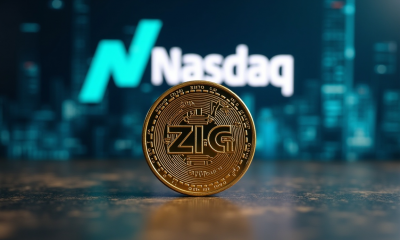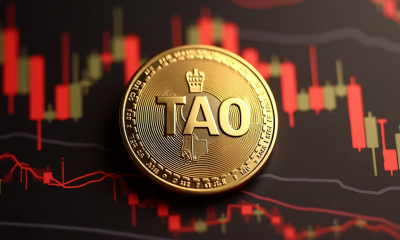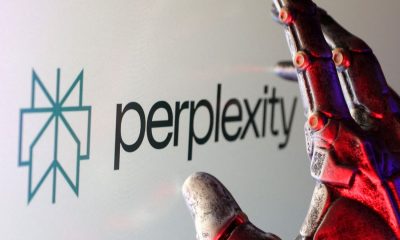

De-fi
Ripple Applies for US Banking License, Heating Up Domestic Stablecoin Race – Crypto News
A growing number of crypto firms have applied for banking licenses or are thinking of doing so as TradFi and crypto continue to mingle.
Two days after USDC stablecoin issuer Circle revealed that it had applied for a national trust bank charter in the United States, Ripple Labs made a similar move.
In an X post on July 2, Ripple CEO Brad Garlinghouse confirmed that the firm has applied to the Office of the Comptroller of the Currency (OCC) for a national bank charter.
It’s a growing trend, as crypto and traditional finance continue to converge. Fidelity’s crypto-focused subsidiary, Fidelity Digital Assets, has also reportedly applied for a national trust charter to complement its New York state-issued license. Anchorage Digital actually received one under the Biden Administration — becoming the first and only crypto firm to get a national bank charter in the U.S., as The Defiant previously reported.
A national bank charter would allow Ripple to engage in fiduciary activities like managing assets and acting as a trustee or custodian.
Citing Ripple’s “long-standing compliance roots,” Garlinghouse noted that if the OCC approves its application, it would have both federal-level oversight, as well as state-level, from the notoriously tough New York Department of Financial Services (NYDFS) via a so-called BitLicense.
That would be, he said in the X post, “a new (and unique!) benchmark for trust in the stablecoin market.”
Circle Internet Group was the first company to receive a NYDFS BitLicense, back in 2015.
In addition to being an original core contributor to XRP Ledger (XRP), Ripple Labs is the issuer of RLUSD, a USD stablecoin. Launched on Dec. 17, RLUSD currently has a market capitalization of $485.1 million, making it within the top-20 stablecoins, but still relatively small.
For comparison, Circle’s USDC has a market cap of $62.2 billion, making it the largest stabelcoin from a U.S.-based issuer, and the second-largest overall. The leading stablecoin by far is Tether’s USDT, with $158.4 billion of the total $264 billion stablecoin market, per CoinGecko data.
Fed Master Account
In addition to the banking license from the OCC, Garlinghouse said that Ripple is also applying for a Master Account with the Federal Reserve, which would give it the ability to custody assets directly with the Fed.
It is doing so through its subsidiary, Standard Custody & Trust Co, which holds an NYDFS limited-purpose trust company charter.
A Fed Master Account would allow Ripple “to hold $RLUSD reserves directly with the Fed and provide an additional layer of security to future proof trust in RLUSD,” Garlinghouse said in the X post.
The stakes are high, said Sid Powell, co-founder and CEO of DeFi asset manager Maple Finance.
“If Ripple were to secure both a banking license and a Federal Reserve Master Account, it would mark a significant milestone in the convergence of crypto and traditional finance,” he told The Defiant, adding:
“These two components would give Ripple direct access to the U.S. payments system, bypassing correspondent banking layers and enabling near-instant settlement at the central bank level, something no crypto-native company has achieved to date.”
Maple’s CEO said the dual move would set a precedent beyond the U.S.: “If Ripple succeeds, it could set a precedent that changes the operating model and competitive dynamics for fintechs and crypto firms globally.”
The Master Account may be more of a stretch than the national bank trust charter. Custodia Bank, which holds a Wyoming-issued Special Purpose Depository Institution (SPDI) state banking license created specifically for digital asset firms, has been refused a Master Account by the Kansas CIty Federal Reserve Bank.
Custodia sued, claiming the rejection was unlawful, and lost at the Federal District Court level, the American Bankers Association noted. Custodia is appealing.
Kraken Financial — the state-chartered bank created by centralized exchange Kraken — also has an SPDI, although it has not applied for a Master Account.
In addition to Fidelity Digital Assets, crypto giants BitGo, Coinbase and Paxos are also reportedly considering applying for federal or state banking licenses.
The flurry of license applications comes as stablecoin and broader crypto market regulatory bills are working their way through Congress. The Senate’s GENIUS Act and House of Representatives’ STABLE Act are being reconciled and could be passed as soon as mid-July.
Just yesterday, House Republican leaders dubbed the week of July 14-18 “Crypto Week,” scheduling floor votes on three high-profile crypto bills, including GENIUS and the crypto market structure bill, the CLARITY ACT.
Collecting Licenses
“It’s no surprise that more companies are pursuing banking licenses right now,” Patrick Gerhart, president of banking operations for Telcoin, told The Defiant, explaining that the licenses are crypto’s attempt to gain legitimacy and integrate with the traditional finance sector:
“With the GENIUS and STABLE Acts gaining traction in Congress, the window is opening for a new wave of institutions to enter the banking sector through charters that give them legitimacy and regulatory clarity. Securing an OCC charter—and potentially a Fed master account—is a major step. If approved, they wouldn’t just be experimenting at the edges of the financial system but rather firmly embedded in it.”
Gerhart added that the crypto industry is “entering a ‘first-to-market’ moment for stablecoin-integrated banking.”
Warning that the path to this type of federal license can be long and tough, he said that the “pace at which these applications move will be telling and could set the tone for how quickly the U.S. banking framework adapts to digital finance.”
-

 Technology1 week ago
Technology1 week agoGiving Nvidias Blackwell chip to China would slash USs AI advantage, experts say – Crypto News
-

 De-fi1 week ago
De-fi1 week agoBittensor Rallies Ahead of First TAO Halving – Crypto News
-

 Business1 week ago
Business1 week agoStarbucks Says Turnaround Strategy Drives Growth in Global Sales – Crypto News
-

 others1 week ago
others1 week agoMETA stock has lower gaps to fill – Crypto News
-

 De-fi1 week ago
De-fi1 week agoBitcoin Dips Under $110,000 After Fed Cuts Rates – Crypto News
-

 Cryptocurrency4 days ago
Cryptocurrency4 days agoAndrew Tate Buys $5 Million Worth of Bitcoin Hours Before Crash – Crypto News
-
Cryptocurrency1 week ago
After 1,993% Burn Spike, Is Shiba Inu Price Set for a Major Trend Reversal? – Crypto News
-

 Cryptocurrency3 days ago
Cryptocurrency3 days agoMany Crypto Treasury Companies Were a Get-Rich-Quick Trap, Warns Columbia Professor – Crypto News
-
others1 week ago
Crypto Market Tumbles as Jerome Powell Says December Rate Cut ‘Far From Certain’ – Crypto News
-

 Blockchain1 week ago
Blockchain1 week agoSmart Money Buys the Dip – Crypto News
-

 Cryptocurrency4 days ago
Cryptocurrency4 days agoBitcoin tests $100K support after massive liquidation event rocks market – Crypto News
-

 Cryptocurrency3 days ago
Cryptocurrency3 days agoStrategy IPO redefines corporate Bitcoin strategy with euro-denominated offering – Crypto News
-

 Metaverse1 week ago
Metaverse1 week agoAI boom is just beginning – Nvidia CEO Jensen Huang explains what’s driving the virtuous cycle – Crypto News
-

 Cryptocurrency4 days ago
Cryptocurrency4 days agoAndrew Tate Buys $5 Million Worth of Bitcoin Hours Before Crash – Crypto News
-

 Blockchain1 week ago
Blockchain1 week agoBasel Reportedly Aims for Friendlier Crypto Bank Guidelines – Crypto News
-

 Cryptocurrency1 week ago
Cryptocurrency1 week agoZIGChain eyes gains as Nasdaq-Listed SEGG Media backs ZIG – Crypto News
-

 Cryptocurrency4 days ago
Cryptocurrency4 days agoLitecoin: $855K ETF inflow sparks new life – Next target is $105 IF… – Crypto News
-

 others1 week ago
others1 week agoGBP/USD tests six months lows as Pound Sterling continues to sink – Crypto News
-
Business1 week ago
Not L1s or Wallets – Who Generates the Bulk of Crypto’s $20B in Revenue? – Crypto News
-

 Cryptocurrency1 week ago
Cryptocurrency1 week agoIs the Market Finally Learning to Handle Volatility? – Crypto News
-

 Cryptocurrency1 week ago
Cryptocurrency1 week agoHBAR under pressure, Descending channel hints at 24% downside move – Crypto News
-

 Cryptocurrency5 days ago
Cryptocurrency5 days agoRipple Just Made XRP and RLUSD Tradeable Like Stocks: Here’s How – Crypto News
-

 Blockchain5 days ago
Blockchain5 days agoStablecoin Orchestration Becomes FinTech Battleground – Crypto News
-
others5 days ago
“Never Had Plans to Sue Binance,” Wintermute CEO Evgeny Gaevoy Confirms – Crypto News
-

 Cryptocurrency4 days ago
Cryptocurrency4 days agoBittensor (TAO) plunges 16% amid broader crypto sell-off – Crypto News
-

 Technology1 week ago
Technology1 week agoInjective (INJ) completes its first community buyback worth $32 million – Crypto News
-

 Technology1 week ago
Technology1 week agoEthereum Foundation launches institutional portal to boost enterprise adoption – Crypto News
-
Business1 week ago
Bitcoin Price Forecast as Trump Cuts Tariffs After US-China Trade Deal – Crypto News
-
others1 week ago
Cardano Price Risks 20% Crash Amid Death Cross and Falling ADA ETF Odds – Crypto News
-
Technology1 week ago
Canary XRP ETF Filing Removes SEC Delay Clause, Targets November Launch – Crypto News
-

 Blockchain1 week ago
Blockchain1 week agoXRP Chart Mirrors Gold Right Before Its Parabolic Run – Crypto News
-

 De-fi1 week ago
De-fi1 week agoFourMeme Surpasses Pumpfun With $43 Million in Monthly Revenue – Crypto News
-
Technology1 week ago
XRP Price Outlook as ETF Nears Possible November 13 Launch – Crypto News
-

 Technology1 week ago
Technology1 week agoCities Deploy Robots as Firefighters, Tour Guides and Lawnmowers – Crypto News
-
others1 week ago
Russia S&P Global Manufacturing PMI dipped from previous 48.2 to 48 in October – Crypto News
-

 Metaverse1 week ago
Metaverse1 week agoPerplexity AI CEO Aravind Srinivas touts new feature revealing Indian politicians’ stock holdings—How will it work? – Crypto News
-
others1 week ago
Pi Coin Price Prediction After AI Investment Announcement – Is a Bull Run Ahead? – Crypto News
-

 Blockchain7 days ago
Blockchain7 days agoChainlink Maintains Its Base, But One Push Could Flip Sentiment Fast – Crypto News
-

 Blockchain5 days ago
Blockchain5 days agoTokenized Treasuries cross $8.6B as banks and exchanges push collateral use – Crypto News
-
Cryptocurrency5 days ago
Crypto Market Crash as $595.8M in Longs is Liquidated, Bitcoin Slides to $105,000 – Crypto News
-
Cryptocurrency4 days ago
Dogecoin Price Risks 20% Crash as Death Cross Aligns With Falling DOGE ETF Inflows – Crypto News
-

 Blockchain1 week ago
Blockchain1 week agoEvernorth Has Reached 95% Of Its XRP Treasury Target – Crypto News
-

 De-fi1 week ago
De-fi1 week agoNEAR Cuts Inflation Rate by Half Despite Failed Community Vote – Crypto News
-

 Technology1 week ago
Technology1 week agoGHOST extends rally as whale scoops 4.8 million tokens – Crypto News
-

 Blockchain1 week ago
Blockchain1 week agoQuantum Computing Still Years from Threatening Bitcoin, Says VC Amit Mehra – Crypto News
-

 others1 week ago
others1 week agoGBP/USD hits seven-month low as UK fiscal woes, Fed hawkishness weigh – Crypto News
-

 Blockchain7 days ago
Blockchain7 days agoBitcoin In IPO Phase As Early Holders Give Way to New Investors – Crypto News
-

 Metaverse6 days ago
Metaverse6 days agoDoes Nvidia’s $5-trillion feat raise the spectre of an AI winter? – Crypto News
-

 Blockchain6 days ago
Blockchain6 days agoWill Bitcoin’s Latest Sunday Pump be Different This Time? – Crypto News
-

 Cryptocurrency4 days ago
Cryptocurrency4 days agoGold declined but still outperformed BTC last week – Crypto News


















